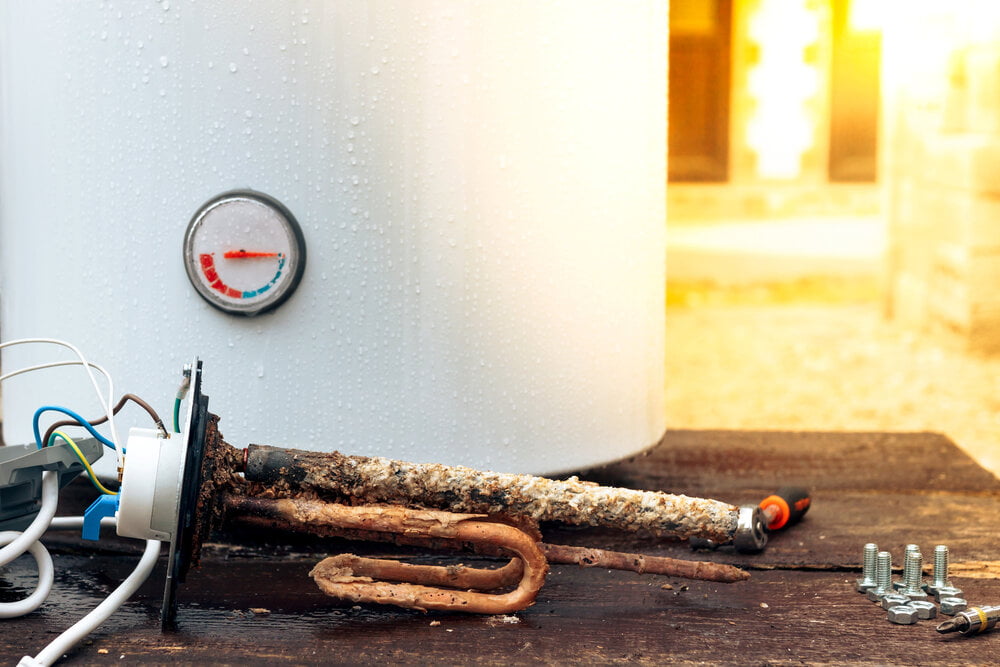Determining whether or not it’s time to replace your water heater can be difficult, or in some cases really quite simple. This guide to “when to replace your water heater” should help give you a clear idea on when to replace, repair or service your home’s water heating system. While this information can apply to most water heaters, it’s intended for homes and residents in the Olympia, Lacey, Tumwater or DuPont, WA area. Region, climate, water qualities and general plumbing code all have an effect on water heater replacement information and can have influence on lifespan. If you have any questions regarding your water heater specifically, feel free to reach out and we’d be happy to answer your questions. Contact Us.

How long does a water heater last?
Generally speaking for Olympia and the surrounding areas, water heaters are replaced (on average) every 10-12 years. This applies to conventional tank type water heaters (both gas and electric) commonly found in residential homes. If your water heater is older than 10 years, it is more likely in need of replacement when a problem occurs. A typical manufacturer’s warranty will cover the first 6 years of usage. Tankless type water heaters with a good maintenance schedule can last quite a bit longer, even exceeding 15-20 years
Water Heater Maintenance
Water heater maintenance is the most important task when it comes to prolonging the life of your unit. Draining, flushing and inspecting conditions of the tank should be performed on an annual basis. Areas with notoriously hard water are suggested to perform maintenance even more often if necessary. This maintenance is preventative and doesn’t allow accumulation of minerals, sediment and other materials that are harsh to the tank. We suggest flushing your water heater every year from the time it is new. Starting a maintenance schedule after several years of never being flushed isn’t advised as can actually promote your water heater to leak or fail. This is one of the factors to consider if your water heater is more than 10 years old. Often times, a repair or service requires draining the tank. If this has never been performed before, the build up inside the tank is disturbed and flushed out exposing weakened points- promoting pinhole leaks and failure. Each situation can vary and if you need additional help in considering whether replacement is necessary, feel free to contact us.

Signs of Wear – Replacement Indications
While some signs of wear are obvious, like evidence of a leak at the base of the water heater- most others indicators are not. Here’s a few points to keep in mind:
Higher utility bill– A common example of your water heater showing signs of wear is a higher utility bill. Most problems with a water heater will also incur more energy to be used. Whether it’s having a difficult time heating the water up to temperature or an active leak is causing it to heat more often, this clue is a good sign to check over your water heater for symptoms.
Leaks – In rare occasions, an active leak will lead to a repair rather than a water heater replacement. Sometimes fittings or certain components can fail and if the water heater is new enough, the problem can be corrected. Proper water heater maintenance on a regular basis can extend this window of time dramatically, savings costs in the long run. If you discover a leak or water at the base of your water heater it’s a good idea to get a professional opinion to help weigh options and considering factors.
Intermittent or cold water – If the hot water temperature is ever anything other than consistent with what you’ve set the water heater at, it’s a good indication that something needs attention. Issues will vary, especially between gas and electric. Given the hazards involved with the working internals of a heating system, we suggest consulting with a professional. Of course, we can help if you’d like to contact us.
Cloudy or rusty colored water – Orange or rusty colored water from the hot supply is a good indication that service or replacement of your water heater is needed. Some possibilities include your Anode Rod being completely used up to the point of the tank itself taking on the corrosion. A corroded tank cannot be repaired and typically fails soon after. Metallic or strange odors can indicate an Anode Rod replacement or supplement given the correct parameters of the tank (age, maintenance records, type).
Water Heater Repair versus Water Heater Replacement Parameters:
Parts you can potentially replace:
- Burner assembly
- Heating elements
- Valves (such as drain valve)
- Thermostats
- Thermocouples
- Igniters
- Motors
You may be able to REPAIR your water heater if:
- The unit is less than ten years old
- A replaceable part is failing
You should consider REPLACING your water heater if:
- The unit is more than ten years old
- It has not been properly maintained
- It is showing signs of wear listed above

